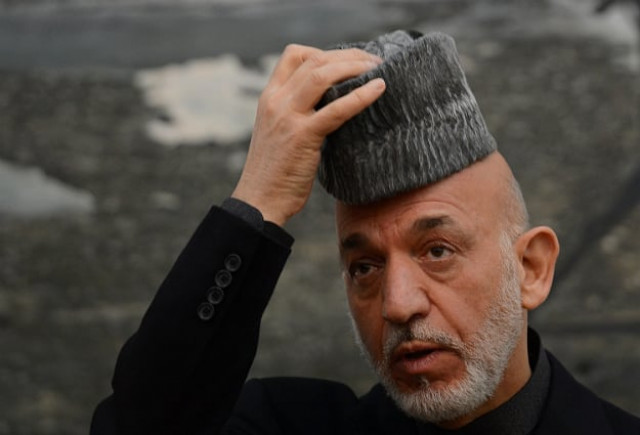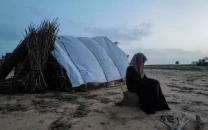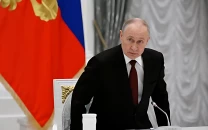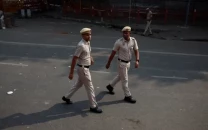Afghanistan rebuffs US demand on signing security deal
Washington warned Kabul on Thursday to act quickly to sign the Bilateral Security Agreement.

Karzai had said the pact currently under consideration by a loya jirga, a meeting of tribal chieftains, could only be signed "when our elections are conducted, correctly and with dignity". PHOTO: AFP/FILE
Washington warned Kabul on Thursday to act quickly to sign the Bilateral Security Agreement (BSA), with senior officials hinting that delaying beyond the end of this year could mean no post-2014 US troop presence.
The latest US run-in with President Hamid Karzai was set off by the Afghan leader saying the painstakingly negotiated deal would not be signed until after the election in April.
US officials bristled, saying the pact, which governs the conditions of any post-war American counter-terrorism and training mission in Afghanistan, must be signed by the end of 2013.
The White House said it needed a swift decision from Karzai to start planning the footprint of any US forces, and warned that President Barack Obama had not yet decided whether or not to keep American forces in Afghanistan.
The White House on Friday repeated its call for the pact to be signed by the end of the year.
"We've made clear that it's imperative that we do it as soon as possible, and further delay is not practical nor tenable," said spokesperson Jay Carney.
Karzai had said the pact currently under consideration by a loya jirga, a meeting of tribal chieftains, could only be signed "when our elections are conducted, correctly and with dignity".
His spokesperson Aimal Faizi stood firm on the issue on Friday.
"Security, peace and good elections are key to the signing of the BSA," Faizi told AFP.
"Let's wait and see what will the loya jirga decide on the document. If approved, as the president said, it will be signed after elections."
Senior US officials speaking on condition of anonymity were blunt, warning that if there were no BSA in force, there would be no US troop garrison in Afghanistan after NATO combat troops leave in 2014.
And Carney warned: "Failure to conclude the BSA by that point (the end of the year) would make it impossible for the United States and our allies to plan for a presence post-2014."
Some jirga delegates voiced frustration at Karzai's unexpected announcement - the latest in a long line of antagonistic outbursts.
"This should be signed by the current government not be left to the next one," Aminullah Muavez, a member of the provincial peace council of Nuristan - a Taliban stronghold in the country's northeast - told AFP.
"If we don't sign it soon, the US might change their mind and withdraw from Afghanistan."
Karzai on Thursday told jirga delegates that the BSA would allow up to 15,000 foreign troops to stay in the war-torn country.
Afghanistan goes to the polls on April 5 to elect a successor to Karzai, who must step down after his two terms. A credible election is seen as crucial to the country's future stability.
The jirga is to give its decision Sunday on the BSA, the text of which was only agreed after months of tortuous negotiations with Washington.
It is widely expected to approve it, though possibly with recommendations or conditions, after which it must also be approved by the Afghan parliament before Karzai can sign it into effect.
Tahira Mirzad, a former MP representing Kapisa province at the jirga, told AFP the country urgently needed the BSA.
"This is a sensitive phase we are going through at the moment. It's a chaotic phase. Every day we have attacks by the enemies. There is a lack of proper training for security forces. We desperately need this pact to be signed," she said.
Obama stepped in this week with a letter to confirm a deal on the vexed question of US forces raiding Afghan homes.
The letter released by Karzai's office said US forces would not enter Afghan homes for military operations "except under extraordinary circumstances involving urgent risk to life and limb of US nationals."
The issue is a sensitive one in Afghanistan and had for a time appeared to pose a serious threat to the deal.
Supporters of the deal say it is vital for post-2014, when the bulk of NATO's 75,000 troops will pull out. The Taliban insurgency this year has reached levels of violence not seen since 2010, according to the United Nations.
The Taliban condemned the jirga as an American plot and threatened to target its delegates if they approve the deal.
A draft text released by Kabul Wednesday appeared to show Karzai had bowed to a US demand that American troops would not be tried in local courts if they are accused of crimes.
A similar security deal between the United States and Iraq collapsed in 2011 over the issue of whether American troops would be answerable to local courts, leading Washington to pull its forces out.



















COMMENTS
Comments are moderated and generally will be posted if they are on-topic and not abusive.
For more information, please see our Comments FAQ